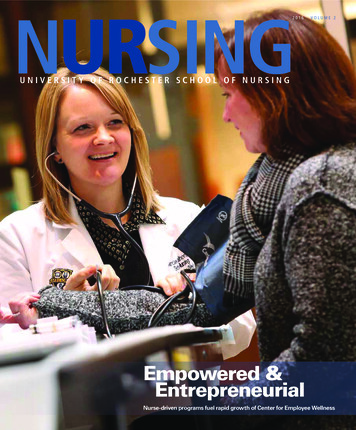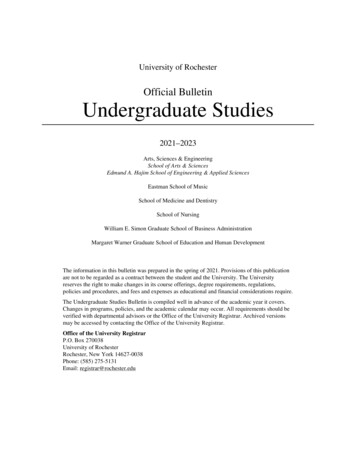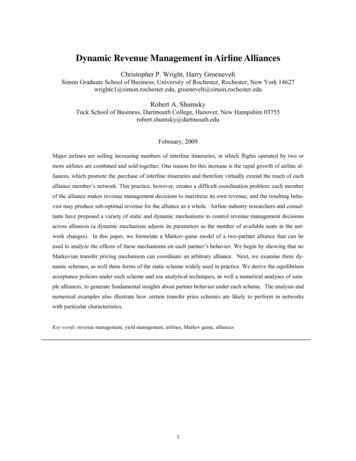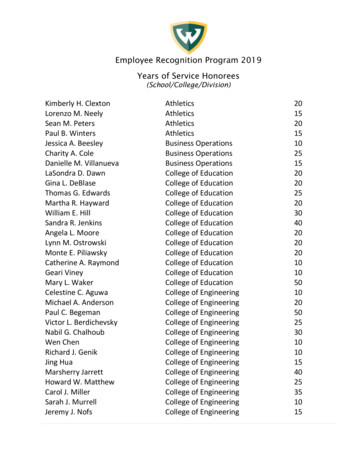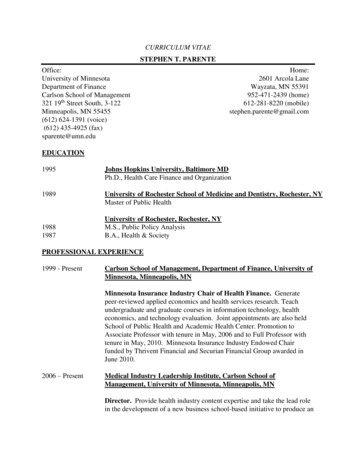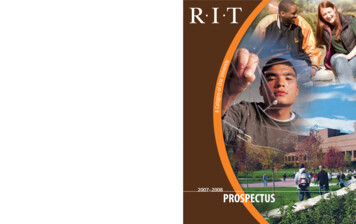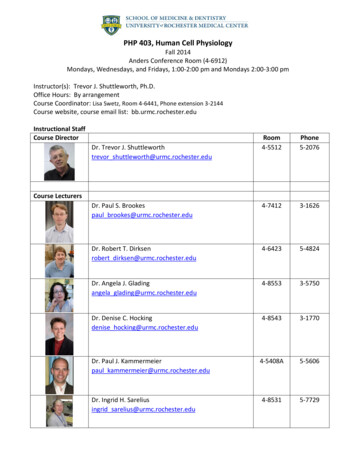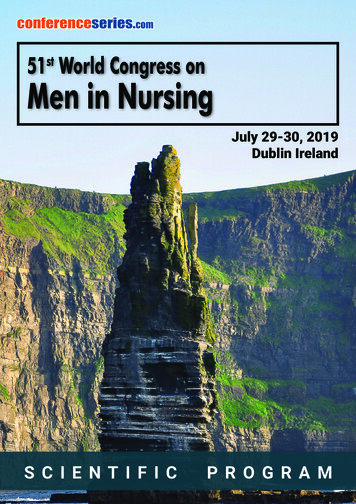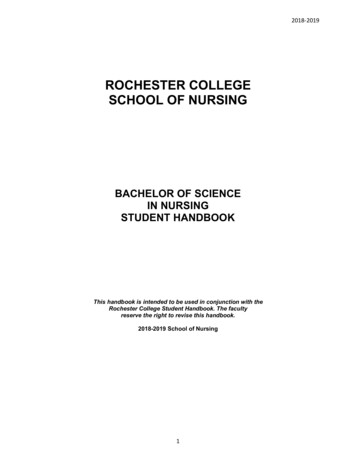
Transcription
2018-2019ROCHESTER COLLEGESCHOOL OF NURSINGBACHELOR OF SCIENCEIN NURSINGSTUDENT HANDBOOKThis handbook is intended to be used in conjunction with theRochester College Student Handbook. The facultyreserve the right to revise this handbook.2018-2019 School of Nursing1
2018-2019Table of ContentsMission Statement and RC-SON Concepts Accreditation .Pre-Licensure Bachelor of Science in Nursing Program .General Education Courses .Required Support Courses .Nursing Courses and Sequence . Levelled Courses Application/Admission Policy .Outcomes . Concepts and Competencies .Academic Advising .Additional Costs Documentation Requirements for Admission Clinical Requirements Student Checklist GENERAL POLICIES .RC-SON Criminal Background Policy .Clinical Requirement Policy .Progression Policy . Math Policy .Testing Policy .Dismissal from Nursing Program .Withdrawal from Nursing Program Policy .Behavior Guidelines Plagiarism Reporting Process .Chain of Communication Laptop Computer Communication Devices APA Writing Style Exam Procedures Invasive Procedure Guidelines .GUIDELINES FOR CLINICAL AND NURSING LAB EXPERIENCES . General Student Attire Student Attire for Acute Care Setting .Student Attire for Community Health and Mental Health Care Setting .Communication Records Client Confidentiality – Protected Health Information Policy (PHI) Attendance - Theory Courses Clinical Absence . .Class and Clinical Cancellation . .Student Parking Personal Belongings Chapel/Convocation Licensing Requirements .Insurance Injury/Exposure/Incident Reporting . .Code of Academic Integrity . .APPENDICES . .APPENDIX A – Comprehensive Clinical Health Form . .APPENDIX B – Hepatitis B Vaccine Acknowledgment and Release . .APPENDIX C – RC SON Occurrence Report .APPENDIX D – Incident Report . . . APPENDIX E – Nursing Student Confidentiality Agreement . .APPENDIX F – Student Acknowledgement Statement . 212131313131314141414141414141516161718292021
2018-2019SCHOOL OF NURSING MISSION STATEMENT AND CURRICULUM CONCEPTSMISSION STATEMENT The mission of the Rochester College School of Nursing is to develop socially consciousprofessional nurses who are empowered to address inequities in healthcare through civic engagement, inter-professionalcollaboration, and servant leadership. Students will utilize clinical reasoning in the context of an inclusive Christianenvironment to provide holistic care for diverse populations.SCHOOL OF NURSING CURRICULUM CONCEPTS1. Challenge of Spirituality: Students are exposed to a Christian perspective and are challenged to approach theirlife and work through personal responsibility and service.2. Critical Thinking: Students demonstrate the ability tointegrate the nursing process, conceptualframeworks/theory, and evidence-based practice (EBP)research to guide decision making in a variety of settings.3. Communication: Students express understanding andcollaborate in diverse contexts using a variety of written andverbal forms.4. Caring: Students actively participate in a caring theorymodel.5. Community Oriented: Students practice in a variety ofsettings, for the purpose of health promotion and diseaseprevention across the lifespan.6. Cultural Understanding: Students obtain knowledge ofdiverse cultures that lead to an opportunity to appreciate avariety of people and their unique health practices and beliefs.ACCREDITATIONRochester College is accredited by the Higher Learning Commission and is a member of the North Central Association.The Baccalaureate in Nursing program at Rochester College School of Nursing is accredited by the Commission onCollegiate Nursing Education, 655 K Street, NW, Washington, DC 20001, (202)887-6791.PRE-LICENSURE BSNThe pre-licensure nursing program requires completion of prerequisite coursework in the pre-nursing degree plan prior to4 levels of coursework within the nursing major. Additional General Education requirements complete the degreerequirements. Graduates of the RC SON Undergraduate program receive a Bachelor of Science in Nursing degree andmay sit for the National Council Licensure Examination-RN (NCLEX-RN ) to become a Registered Nurse. The prelicensure Bachelor of Science in Nursing degree program is comprised of the following requirements:GENERAL EDUCATION COURSESInformation Literacy (6 hours)ENG 1113 Composition AENG 1123 Composition B or HON 2013Communication Literacy (3 hours)COM 1013, COM 2223, HON 2013Quantitative Literacy (10 hours)Lab Science: CHE 1314 Intro to Chemistry ISocial and Behavioral Science: BUS 2513; GEO 1013, 3113; HON 2213, 3213; MIN 2613; PED 2023; POS 2013, 2023,2043, 3013, 4013, 4213, 4613, 4913; PSY 2013, 2113, 2223, 2233; SOC 2013, 2453; SWK 2013, 3003, 3103Critical Thinking/Mathematical Competency: MAT 1203, MAT 1103 or above; HON 2314 (Pre-Nursing/Nursingstudents are advised to take MAT 1203 - Survey of Mathematics)Cultural Literacy (12 hours)Fine Arts Appreciation: ART 1413, 2003, 2213, 2233, 2413, 3213, 4123; ENG 3523; FLM 2013, 2423; HON 2113, 3113;INS 2133; MUS 1203, 2303; PHI 4413; THE 2003, 3313, 3323Literature: ENG 2513, 2713, 2723, 3213, 3223, 3313, 3323, 4413; HON 2113; THE 4743Global Studies and Diversity: BUS 3033; COM 3533; ECS 3423; EDU 3263; ENG 2713, 2723, 4413; GEO 1013, 3113;HIS 2213, 2413, 3423; HON 2213, 3213; INS 2123, 2133; LDR 3733; PHI 3043; PSY 3423; RDG 4353; REL 3923; SEN2013, 3003, 3023, 3033; SOC 2453Western Studies: HIS 1313, 1323, 2113, 2513, 2523, 3313, 3323, 3503, 3513, 3523, 3533, 3543, 3553, 4323, 4333,4513, 4523; HON 2113, 3113; INS 3113; PHI 20133
2018-2019Theological Literacy (9 hours)REL 1003 - Introduction to the Christian FaithREL 1013 - Survey of Biblical LiteratureBIB 2113, 2223, 2333, 2983, 3113, 3123, 3153, 3203, 3273, 3283, 3323, 3613, 4193, 4293, 4394; HIS 2213; PHI 3043;REL 3923; THL 2013, 2023, 3613, 3623, 3793, 3893 (waived if transferring more than 29 hours)REQUIRED SUPPORT COURSESCHE 1314 (See General Education Courses-Lab Science)BIO 1013/1011 Biological Science I/LabBIO 2011 Intro to Anatomy and Physiology LabBIO 2013 Intro to Anatomy and Physiology LectureBIO 3323/3321 Microbiology/LabCHE 1324 Intro to Chemistry IIPSY 2223 Life Span DevelopmentNURSING COURSESFALL-1ST YEARNUR 2102 Introduction to Professional NursingNUR 2304 Health AssessmentNUR 2402 Fundamentals of Nursing with clinicalNUR 2503 Nursing Skills AcquisitionsSPRING-1ST YEARNUR 2203 Integrated PathophysiologyNUR 2604 Innovative PharmacologyNUR 2705 Medical/Surgical Nursing I with clinicalFALL-2ND YEARNUR 3215 Medical/Surgical Nursing II with clinicalNUR 3314 Mental Health Nursing with clinicalNUR 3412 Applied Nursing Research ISPRING-2ND YEARNUR 3422 Applied Nursing Research IINUR 3514 Maternal-Infant Nursing with clinicalNUR 3614 Pediatric Nursing with clinicalFALL-3RD YEARNUR 4115 Medical/Surgical Nursing III with clinicalNUR 4214 Population Based Nursing with clinicalSPRING-3RD YEARNUR 4414 Pre-Licensure Capstone PracticumNUR 4614 Comprehensive NursingCAN BE TAKEN EITHER FALL OR SPRING-3RD YEARLDR 3653 Strategic Leadership Theory and PracticeAPPLICATION/ADMISSION POLICY – TRADITIONAL PRE-LICENSURE NURSING PROGRAMA.B.C.D.E.F.Application deadline for Fall entry into Rochester College School of Nursing is the last Friday in May. Complete applicationincludes full acceptance to Rochester College and receipt of all transcripts by the application deadline.To be eligible to apply, applicants must have a minimum GPA of 3.2 in cumulative and a minimum GPA of 3.0 in prerequisitecoursework.Rochester College School of Nursing applicants will submit a personal goal statement in a Word document to sgriffin@rc.edu bythe last Friday in May. This 500-1000 word essay should highlight the reasons the applicant wants to attend Rochester CollegeSchool of Nursing and describe skills, experiences, and personal attributes that make him/her a good fit for the nursingprofession. This goal statement will be used as a source of information about the applicant and as an example of the applicant’swriting ability.As part of the application review process, potential Rochester College School of Nursing candidates will be invited to anindividualized face-to-face interview with nursing faculty. Qualifying applicants will be notified of their interview date and time.Important documents in this evaluation also include the academic transcript and the personal information provided on theRochester College application form.Decisions regarding acceptance to Rochester College School of Nursing are made by the Admissions Committee.The Admissions Committee reviews all applications that meet minimum requirements.4
2018-2019LEVEL 1 COURSESLEVEL 2 COURSESLEVEL 3 COURSESLEVEL 4 COURSESNUR 2102NUR 2203NUR 3422NUR 4414NUR 2304NUR 2604NUR 3514NUR 4614NUR 2402NUR 2705NUR 3614NUR 2503NUR 3215NUR 4115NUR 3314NUR 4214NUR 3412FRESHMAN DIRECT ADMIT APPLICATIONInformation on Freshman Direct Admit can be found at the following link: sing/BSN PROGRAM OUTCOMESEnd of Program, Leveled OutcomesAt the end of Level IV, and at the end of the program, the RC-SON graduate will be able to:1. Support individuals, families, and communities as an advocate. (Challenge of Spirituality)Evaluate the impact of spiritual beliefs. Level III:Interpret impact of spiritual beliefs and values on life, health, illness, and death. Level II:Identifies own personal attitudes, value, and beliefs. Level I:2. Synthesize knowledge from liberal arts, applied sciences, and current research in the delivery of nursingcare. (Critical Thinking)Examine research as a tool for seeking answers to clinically significant nursing Level III:problems.Demonstrates the use of the nursing process as a systematic approach for thinking Level II:through practice issues.Define conceptual/theoretical frameworks to organize nursing practice. Level I:3. Evaluate communication techniques utilized in the teaching-learning process. (Communication)Compare and contrast different communication strategies. Level III:Apply therapeutic communication principles during interactions with others. Level II:Describe verbal and non-verbal language that conveys the intended meaning. Level I:4. Model behaviors associated with Jean Watson’s Theory of Human Caring/Caring Science. (Caring)Demonstrate Jean Watson’s Theory of Human Caring/Caring Science behaviors. Level III:Discuss Jean Watson’s Theory of Human Caring/Caring Science Level II:5.6.Define Jean Watson’s Theory of Human Caring/Caring Science Level I:Develop commitment to community involvement and leadership. (Community Oriented)Appraises own practice of nursing through leadership and community service. Level III:Demonstrate health promotional and disease prevention activities in a variety of Level II:settings.Identify health promotion and disease prevention strategies in a variety of settings. Level I:Advocate for culturally diverse healthcare practices. (Cultural Understanding) Level III:Level II:Level I:Appraise culturally diverse healthcare practices.Demonstrate cultural assessment.Recognize diverse cultural practices.5
2018-2019Description of Competencies and Alignment with Professional Standards [Essentials of Baccalaureate Educationfor Professional Nursing Practice (AACN, 2008); Nursing Scope and Standards of Practice (ANA, 2015)]Level 1 Courses(Outcome)Competency(Identifies ownpersonal attitudes,value, and beliefs.)Recognize personalattitudes, values, andbeliefs duringtreatment of illness.Examine how personalvalues relate tocontemporary ethicalissues. (AACNEssential I, II, VII, IX)(ANA Standard 7,8,14)Level 2 Courses(Outcome)Competency(Interpret impact ofspiritual beliefs andvalues on life, health,illness, and death.)Examine personal andclient attitudes, values,and beliefs, and itseffects on health,illness, and death.Incorporatelegal/ethical standardsand accountability intoprofessional nursingpractice.(AACNEssential I, VI, VIII, IX)(ANA Standard 8,9)Level 3 Courses(Outcome)Competency(Evaluate the impactof spiritual beliefs.)Evaluate and modifycare plans inrecognition of clientpractices/beliefs.Honor client practicesto promote health andwellness. (AACNEssential I, VI, IX)(ANA Standard 7, 9)Level 4 Courses(Outcome)Competency(Support individuals,families, andcommunities as anadvocate.)Demonstratesgenuine interest inothers.Practices lovingkindness, associatedwith Jean Watson’stheory of HumanCaring/CaringScience, andequanimity. (AACNEssential I, VI, IX)(ANA Standard cal frameworks toorganize nursingpractice.)Completebasic nursing skillsusing the nursingprocess.Applies Standards ofPractice in the nursingcare of individuals.Comprehend thecritical thinkingprocess and itsrelevance to nursingpractice. (AACNEssential III, V, VII,VIII, IX) (ANAStandard 5, 7)(Demonstrate the use ofthe nursing process as asystematic approach forthinking throughpractice issues.) Utilizethe nursing process as asystematic approach forthinking throughpractice issues.Examine how theteaching-learningprocess is related to thenursing process.Determines caremanagement needs ofclients, and identifiesresources that affectdelivery of care andclient outcomes. (AACNEssential III, V, VII, VIII,IX) (ANA Standard 13,14)(Examine research as atool for seekinganswers to clinicallysignificant nursingproblems.) Critiquethe value of his/hercritical thinkingprocess.Utilize research as atool for seekinganswers to clinicallysignificant nursingproblems.Manages complexitiesof clients. Identifiesneeds, and anticipatescoordination ofservices. (AACNEssential III, V, VII,VIII, IX) (ANA Standard9, 13, 14, 15)(Synthesizeknowledge fromliberal arts, appliedsciences, and currentresearch in thedelivery of nursingcare.) Evaluates andrevises decisions.Critically evaluatesnursing care issues,and developsappropriate actionsfor clinicalsituations.Collaborates with thehealthcare team topromoteachievement ofclient outcomes.(AACN Essential III,V, VII, VIII, IX) (ANAStandard 10, 13, 14,16, 17)Communication(Describe verbal andnon-verbal languagethat conveys theintended meaning.)Differentiatesbetween therapeutic,social, andprofessionalcommunication.Applies principles oftherapeuticcommunication withassigned clients.(Apply therapeuticcommunicationprinciples duringinteractions withothers.) Demonstrateseffectivecommunication skillsduring nurse-client andprofessionalinteractions.Demonstrate ability tocommunicate in writingwith a variety of(Compare and contrastdifferentcommunicationstrategies.) Affectspatient care throughinitiation of effectivecommunication(written and verbal)with clients andcolleagues.Evaluates owncommunication skills.(AACN Essential I, IV,(Evaluate thecommunicationtechniques utilized inthe teaching-learningprocess.)Communicateseffectively withhealth care team inthe role of theleader/manager.Communicateseffectively withcommunities andRC-SONConceptsChallenge ofSpirituality6
2018-2019(AACN Essential I, IV,VI, VII, IX) (ANAStandard 9)Caring(Define Jean Watson’sTheory of HumanCaring/CaringScience)Recognize the coreconcepts of thetheory.Describe various waysof caring. (AACNEssential I, VI, VII, IX)(ANA Standard 7,8,9,10)audiences. (AACNEssential I, IV, VI, VII,IX) (ANA Standard9,10)VI, VII, IX) (ANAStandard 9,10, 13,14)(Discuss Jean Watson’sTheory of HumanCaring/Caring Science.)Apply concepts of thetheory to support acaring and healingenvironment andteamwork.Educate the client inmaking informedchoices. (AACNEssential I, VI, VII, IX)(ANA Standard 12, 13)(Demonstrate JeanWatson’s Theory ofHuman Caring/CaringScience behaviors.)Engage in caringhealing practices.Engage in genuineteaching-learningwithin the client’sframe of reference.(AACN Essential I, VI,VII, IX) (ANA Standard13,15, 17)non-nursing officialsto promote healthcare initiatives.(AACN Essential II,III, IV, VI, VII, IX)(ANA Standard 9,10, 13, 14, 15)(Model behaviorsassociated with JeanWatson’s Theory ofHuman Caring/CaringScience.) Embracealtruistic values andpractice-lovingkindness with selfand others.Practicesdiscernment inevaluatingcircumstances andsituations vs. beingjudgmental.(AACN Essential I, II,III, VI, VII, IX) (ANAStandard 11,15,16)CommunityOriented(Identify healthpromotion and diseaseprevention strategiesin a variety ofsettings.)Explain basickey health promotionand risk reductionstrategies.Describe healthdeterminants relevantto the individual,family, andcommunity. (AACNEssential I, V, VII,VIII, IX) (ANAStandard 7,11)(Demonstrate healthpromotional and diseaseprevention activities ina variety of settings.)Educate clients aboutdisease prevention andrisk reductionstrategies.Analyze the importanceof cultural and globalfactors on perception ofhealth and illness.(AACN Essential I, V,VII, VIII, IX0 (ANAStandard 7, 17)(Appraises ownpractice of nursingthrough leadership andcommunity service.)Identifies vulnerablepopulations.Apply diseaseprevention and riskreduction strategies tovulnerablepopulations.(AACNEssential V, VII, VIII,IX) (ANA Standard 7,13, 16, 17)(Developcommitment tocommunityinvolvement andleadership.)Examines the role ofnurses beyond theacute care setting.Examines policies andpractices affectinghealth care.Identifies strategiesto remedy social orinstitutional ethicalissues. (AACNEssential II, V, VII,VIII, IX) (ANAStandard 7,10,11,12, 16, 17)CulturalUnderstanding(Recognize diversecultural practices.)Situate professionalnursing in thetreatment of diseasewithin the culturalcontext. Performappropriateassessments fordiverse clients. (AACNEssential I, VIII, IX)(ANA Standard 1,2,(Demonstrate culturalassessment.)(Appraise culturallydiverse healthcarepractices.)Differentiate betweencultural and socialdeterminants ofhealth.(Advocates forculturally diversehealth carepractices.) Identifybarriers to a diverseworkforce in nursing.Identify strategiesthat will improveworkforce diversity innursing. Examinesstrategies to improvecultural competenceSituate healthassessment within thecultural context.Implement nursinginterventions thatreflect understanding ofdiversity. (AACNEssential III, VII, IX)(ANA Standard 1,2,3,7Develop plan of carefor culturally diversevulnerable populations.(AACN Essential III,
2018-20198)4, 8)VII, IX) (ANA Standard4,5a, 5b, 8)in the clinicalsettings.(AACN Essential III,VII, IX) ANA Standard5a, 5b, 6, 8)ACADEMIC ADVISINGThe Academic Coordinator will help students with class scheduling, transcript updating, transfer evaluation and generalquestions about Rochester College. It is the student’s responsibility to meet with the Coordinator at least once eachsemester to ensure that the student is meeting requirements for the nursing program and is progressingsatisfactorily towards graduation.All faculty serve as Academic Advisers to students. They will advise students about professional/academic direction andother nursing questions.ADDITIONAL COSTS FOR NURSING STUDENTSACEMAPP clinical placement (annual) 50Drug Screen (annual) 38 at Crittenton (Check w/PCP/possible ins. coverage)Michigan Background Check (annual)stImmunizations/titers (1 year if not up-to-date) 10Varies[MMR, Varicella, Hep B, TDaP(every 10 years)]Check with PCP/possible insurance coverageTb skin test (annual)varies (Check with PCP)Flu vaccine (annual)Free at RC Health FairstPhysical exam (1 year only)Varies/May be covered by insurance at PCPCPR certification (every 2 years) 80 (if completed at Rochester College)Must be Basic Life Support (BLS) Health Care Provider (HCP)Uniform with RC logo (1st year only) 130- 150Kaplan NCLEX test prep (every semester) 100Lab fee (1st year only) 100Skills Lab Kit (1st year only) 236stSecondary skills equipment (1 year only)varies(Includes stethoscope, BP cuff, hemostat/scissors, and penlight)Available at Scrubs and BeyondNational Student Nurse Association membership 35DOCUMENTATION REQUIREMENTS FOR ADMISSION TO RC SONAll official documents are to be completed before a student is allowed to attend lecture/clinical. Rochester College usesACEMAPP as our clinical placement tool. Upon acceptance into the Rochester College School of Nursing, new studentnames and email addresses will be provided to ACEMAPP.Once the student has an ACEMAPP account, the following requirements will be uploaded, by the student, toACEMAPP. Please use the uploading instructions from the following ACEMAPP link: https://acemapp.org/kb/578
2018-2019To be uploaded to ACEMAPP:oPhysical Exam. Complete the student information portion of the Comprehensive Clinical Health Form(Appendix A) and take it to your appointment. The top portion is to be filled out by the student; the bottom portionby the healthcare provider. You can complete this at your private physician’s office and bill to your healthinsurance company (if applicable).oDrug Screen. A urine drug screen may be obtained at the student’s private physician’s office or at CrittentonHospital’s Occupational Medicine dept. (248-652-5203). Go to Crittenton ER between 7am-4pm to leave a urinesample. Ask to have the results sent to Rochester College School of Nursing. The student will be responsible forpayment. The drug screen will need to be submitted at the beginning of each school year.oBackground Check. RC SON requires a Michigan State Police online background check in order to comply withclinical agency requirements. The background check will be required at the beginning of each year of nursingschool. If the student provides a background check from another source it must be a statewide Michigan search.Please follow the procedure listed below for obtaining clearance:Log on to https://apps.michigan.gov/Home/Login?q MlGPpWZJC eyoP6U6CpNUg %27. Choose the“Get Started” tab. Log in as a guest user and follow instructions. Review the information provided, followthe requirements, and print your search. Print the sheet with results and not the payment confirmationpage. (There is a 10 charge [Visa, Discover, or MasterCard] by the Michigan State Police for thisservice).oImmunization Records. Students must provide documentation of all vaccines received. Without proof of vaccine,titers will need to be obtained to show immunity. Proof of immunization will be needed for Hepatitis B, MMR(Mumps, Rubella and Rubeola), TDaP (pertussis must be a part of this), Varicella (disease history ofchicken pox is not proof), and flu (immunization offered later in Fall). Students should keep a copy for theirrecords.oBLS Healthcare Provider. Students must have a valid American Heart Association (AHA) Basic Life Support(BLS) Healthcare Provider card prior to starting class. The BLS card will be valid for 2 years. Re-certificationmust be completed and uploaded to ACEMAPP prior to expiration. The BLS card must be kept current throughoutnursing school.9
2018-2019Clinical Requirements Student ChecklistREQUIREMENTFREQUENCYPROOF OF REQUIREMENTBackground checkAnnuallyCopy of criminal record responseMMR (Mumps,Rubella, Rubeola)One timeDocumented dates of 2 vaccinations ORTiters indicating immunizationVaricellaOne timeDocumented date of vaccination OR Titerindicating immunizationHepatitis BOne timeDocumented dates of 3 vaccinations ORTiters indicating immunization OR signedwaiver (Appendix B)TDaPEvery 10 yearsDocumentation of injection (Pertussis mustbe included)TB Test (PPD)AnnuallyDate and result of skin test. Chest X-ray withnegative result will be accepted if studenthas a history of positive skin testDrug ScreenAnnuallyCopy of drug screen resultBLS/HCPEvery 2 yearsCopy of BLS/HCP cardFlu VaccineAnnuallyDocumentation of injectionGENERAL POLICIESRC SON CRIMINAL BACKGROUND POLICYAdmission to RC School of Nursing academic program is conditional upon review of prospective student’s criminalbackground check.Policy:A.Students must submit annual criminal background check prior to the start of each fall semester.B.Any applicants with a misdemeanor on their record must meet with the Dean/Director of RC SON prior tothe beginning of the academic year.C.Any active RC SON student who commits a misdemeanor will be subject to the State of Michigan Boardof Nursing rules.D.If a student commits a felony while enrolled in the RC School of Nursing, the student will be dismissedfrom the RC School of Nursing.CLINICAL REQUIREMENT POLICYA.B.C.Rochester College School of Nursing Clinical requirements, as outlined in the clinical requirement studentchecklist, is to be updated/completed and uploaded to ACEMAPP two weeks prior to the fall semester.Any requirement, as outlined in the clinical requirement student checklist, that expires within theacademic year must be updated and submitted prior to the expiration date.Students may not attend clinical with any undocumented or expired clinical requirements.10
2018-2019PROGRESSION POLICY All NUR courses required for the nursing education program will be evaluated based on satisfactory completion ofclass, lab, and/or clinical competencies. The classroom competency standard requirement is 80% or higher.Students are required to achieve a satisfactory evaluation in the lab and clinical components of each NUR course.Numerical grades below 80% in the NUR courses and/or an unsatisfactory lab and/or clinical evaluation for thesemester are considered unsatisfactory attainment of course competencies. One Unsatisfactory evaluation inclass, lab and/or clinical will result in the student’s failure to progress in the NUR course sequence. Students whocomplete a nursing course with a 79.9 average or below will not progress in the nursing program. In clinicalcourses, final course grade will reflect actual cumulative test score earned from objective testing of course nativeexams. In non-clinical courses, final course grade will reflect actual grade earned by total body of work in thecourse. Progression to the next level of clinical courses cannot occur without successful completion of theprevious level clinical courses.Students who experience non-progression in the nursing program and who desire to remain in the program mustsubmit a reflective summary with a plan for improvement. They must also meet with their academic faculty.A student must submit the reflective summary with a statement of intent to remain in the program and theirimprovement plan within six months from the term of non-progression to be reinstated as a RC SON student.Reinstatement to the nursing program will be allowed one time only. Acceptance is contingent upon:oo Meeting the current admission, advanced placement, and graduation requirements in effect at the time ofconsideration for reinstatement.Submitting a reflective summary, statement of intent to remain in the program, and a plan for improvement.Failure of any two nursing courses/clinical will result in dismissal from the Rochester College School of Nursing.Program completion must occur within four years of entry into the School of Nursing.MATH POLICYIn order to demonstrate competency in calculating safe medication dosages, the student is required to pass a mathcompetency examination each semester with a score of 100% prior to administering medication in clinical. Students havethree (3) attempts to achieve this benchmark. The 2nd/3rd attempt can occur no less than 48 hours after the previousattempt allowing time for remediation. Students who are not successful after the 3rd attempt are deemed unsafe in clinicalpractice and will receive a grade of “unsatisfactory” for the clinical component of the course. No additional attempts maybe given and no alternative assignments may be utilized in place of this competency examination.TESTING POLICYIn order to receive a passing score in a NUR course with clinical, a student must average a cumulative score of 80% onexaminations. This average is to include all course-native examinations. Kaplan product testing will not be included.DISMISSAL FROM NURSING PROGRAMStudents may be dismissed from the RC SON when any of the following occur:1. A student earns less than a 2.7 (80%) in any nursing course. In a clinical/lecture class the student must pass bothcomponents to pass the class. Clinical is a pass/fail.2. A student earns less than a 2.0 (73%) in a general education class.3. A student withdraws from or earns an incomplete in a nursing course.4. A student engages in any act that is in violation of the Criminal Code of Michigan or compromises the welfare orintegrity of another person.5. A student experiences physical, behavioral or psychological difficulties that would interfere with his or her ability tomeet academic or professional standards.6. A student produces a drug screen that reflects illicit drug use or a background check that reveals a criminalrecord.WITHDRAWAL FROM NURSING PROGRAM POLIC
The Baccalaureate in Nursing program at Rochester College School of Nursing is accredited by the Commission on Collegiate Nursing Education, 655 K Street, NW, Washington, DC 20001, (202)887-6791. . includes full acceptance to Rochester College and receipt of all transcripts by the application deadline. B. To be eligible to apply, applicants .
